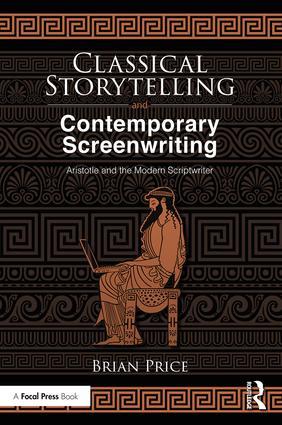Classical Storytelling and Contemporary Screenwriting [...]
About
Classical Storytelling and Contemporary Screenwriting:
Aristotle and the Modern Scriptwriter, 1st Edition
By Brian Price
ISBN 9781138553408; Paperback, 244 pages
Since we first arrived on the planet, we’ve been telling each other stories, whether of that morning’s great saber-tooth tiger hunt or the latest installment of the Star Wars saga. And throughout our history, despite differences of geography or culture, we’ve been telling those stories in essentially the same way. Why? Because there is a RIGHT way to tell a story, one built into our very DNA. In his seminal work Poetics, Aristotle identified the patterns and recurring elements that existed in the successful dramas of his time as he explored precisely why we tell stories, what makes a good one, and how to best tell them. In Classical Storytelling and Contemporary Screenwriting, Brian Price examines Aristotle’s conclusions in an entertaining and accessible way and then applies those guiding principles to the most modern of storytelling mediums, going from idea to story to structure to outline to final pages and beyond, covering every relevant screenwriting topic along the way. The result is a fresh new approach to the craft of screenwriting—one that’s only been around a scant 2,500 years or so—ideal for students and aspiring screenwriters who want a comprehensive step-by-step guide to writing a successful screenplay the way the pros do it.
Table of Contents
Acknowledgements
Preface: Some Obligatory Backstory
SECTION ONE: A PROLOGUE
Chapter 1 – Introduction: What You Hold in Your Hands
Chapter 2 – Aristotle’s Poetics: It’s All Greek to Me
Chapter 3 – Motivating Factors: Why We Tell Stories
Chapter 4 – Starting the Journey: Defining the Road Ahead SECTION TWO: A BEGINNING
Chapter 5 – Story: And I’m Sticking To It
Chapter 6 – Ideas: Liar, Liar Pants on Fire
Chapter 7 – Conflict: People Who Write Should Throw Stones
Chapter 8 – Wholeness: We Need Some Closure
Chapter 9 – Magnitude: It All Boils Down to One Thing
Chapter 10 – Loglines: Putting It All Together (Part 1)
SECTION THREE: A MIDDLE
Chapter 11 – Plot: Let’s Stay Connected
Chapter 12 – Reversals and Revelations: Pieces of the Action
Chapter 13 – Change of Fortune: Covenant of the Arc
Chapter 14 – Fatal Flaw: And the Plot Thickens
Chapter 15 – Structure: The Shape of Things to Come
Chapter 16 – The 3 Acts: Let’s Break It Down
Chapter 17 – Anchor Points: A Pattern of Design
Chapter 18 – Character: The Agents of the Action
Chapter 19 – Defining Traits: What’s Good and Appropriate
Chapter 20 – The 5 Ps: They Help Build Character
Chapter 21 – Motivating Behavior: Goooooal!
Chapter 22 – Structure Revisited: Filling in the Gaps
Chapter 23 – Set-Up: Stepping Stones of Act One
Chapter 24 – Complications: Stepping Stones of Act Two
Chapter 25 – Resolution: Stepping Stones of Act Three
Chapter 26 – Stepping Stones: Building the Great Pyramids
Chapter 27 – Beat Sheets: Putting It All Together (Part 2)
SECTION FOUR: AN END
Chapter 28 – Scenes: The Building Blocks
Chapter 29 – Description: What You See Is What You Get
Chapter 30 – Dialogue: What You Say is What You Get
Chapter 31 – Dialogue continued: Still More Left to Say
Chapter 32 – Formatting: Ah, the Lovely White Space
Chapter 33 – Pages: Putting It All Together (Part 3)
Chapter 34 – First Draft: And You’re Finally Done
SECTION FIVE: A RESOLUTION
Chapter 35 – Rewriting: Ha! You Thought You Were done
Chapter 36 – Theme: What’s It All About, Ari?
Chapter 37 – Conclusion: Bringing It All Back Home
APPENDICES
Aristotle’s Guiding Precepts
Assignments
Recommended Reading
Recommended Movies
Attributions
About the Author
Reviews
"The insights in this volume could be provided only by an author like Brian Price, himself an experienced creator of narratives and a respected writing educator. In accessible language he explains why, millennia after his death, for contemporary dramatic writers Aristotle is more relevant than ever. Here is no pie-in-the-sky philosophical preaching but a hands-on guide to buttress storytelling craft for writers both new and experienced." —Professor Richard Walter, Associate Dean; Screenwriting Area Head, UCLA School of Theater, Film and Television
"Brian Price delivers a masterful book on the essential precepts of classical storytelling, and their importance in crafting a successful screenplay—a wonderfully fresh take on the craft that both aspiring screenwriters and professionals alike will prosper from." —Cornelius Uliano,Writer/Producer, The Peanuts Movie (2015)
"When inspiration, craft, and chocolate have done all they can, one returns to first principles as Brian Price masterfully lays them out. I've watched Brian guide new voices for decades, and there's nobody better at identifying the heart of your story and what it needs from you next." —Brian Nelson, Screenwriter, Hard Candy (2005), 30 Days of Night (2007), Devil (2010)
"He examines everything from building the scene to developing the characterization. Like Aristotle, he says everything must further the story. The book's strong point is the profusion of examples from modern English language movies from Airplane! to Working Girl. Price sets forth 20 Guiding Precepts of Aristotle that the modern screenwriter can apply (and one of his own as well)." —Conrad J. Obregon
Brian Price is an award-winning screenwriter who has worked with major studios, television networks, and independent film producers from around the world. As an instructor, he has taught screenwriting at Yale University, Johns Hopkins University, and the Brooks Institute, among others, and is a proud member of the prestigious UCLA School of Theater, Film and Television screenwriting faculty.
- Short Description: Classical Storytelling and Contemporary Screenwriting: Aristotle and the Modern Scriptwriter, 1st Edition
- Website URL: https://studentfilmmakersstore.com/collections/screenwriting/products/classical-storytelling-and-contemporary-screenwriting-aristotle-and-the-modern-scriptwriter-1st-edition
-
Anong Lawan and Marianna Schmidt like this
